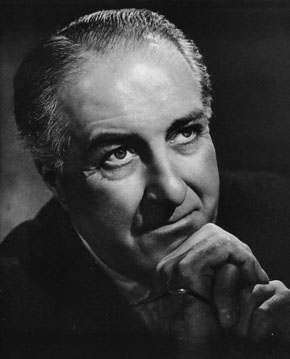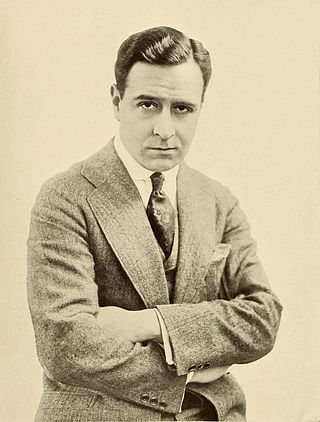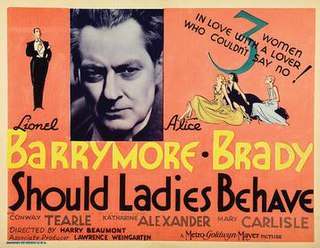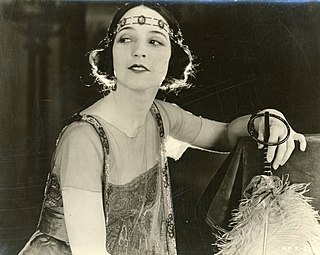Vanity Fair is a 1932 American pre-Code drama film directed by Chester M. Franklin and starring Myrna Loy, Conway Tearle and Anthony Bushell. The film is modernized adaptation of William Makepeace Thackeray's 1848 novel of the same name with the original Regency-era story reset in Twentieth Century Britain. Three years later Thackeray's novel was adapted again as Becky Sharp, the first three-strip technicolor film.

Bad Company is a 1925 American silent romantic drama film directed by Edward H. Griffith, based on a story by John C. Brownell. It stars Madge Kennedy, Conway Tearle, and Bigelow Cooper.

Sir Godfrey Seymour Tearle was a British actor who portrayed the quintessential British gentleman on stage and in both British and US films.

The Greater Glory is a 1926 American silent drama film directed by Curt Rehfeld. The film starred Conway Tearle and Boris Karloff. The Greater Glory is sometimes listed as The Viennese Medley, the title of Edith O'Shaughnessy's novel of which the film is based.

Conway Tearle was an American stage actor who went on to perform in silent and early sound films.

Stella Maris is a 1918 American silent drama film directed by Marshall Neilan, written by Frances Marion and based on William John Locke's 1913 novel of the same name. The film stars Mary Pickford in dual roles as the title character and an orphan servant.

The Great Divide is a 1925 American silent drama film directed by Reginald Barker and produced and distributed by MGM. The film stars Alice Terry, Conway Tearle, and Wallace Beery. It is based on the William Vaughn Moody play, being the second of three film adaptations. The play had been made famous on the 1906 Broadway stage with Margaret Anglin, Henry Miller, Laura Hope Crews, and a pre-Griffith Henry B. Walthall in the principal parts.

Should Ladies Behave is a 1933 American pre-Code comedy film directed by Harry Beaumont and written by Bella Spewack and Sam Spewack, adapted from the play, "The Vinegar Tree" by Paul Osborn. The film stars Lionel Barrymore, Alice Brady, Conway Tearle, Katharine Alexander and Mary Carlisle. The film was released on December 1, 1933, by Metro-Goldwyn-Mayer.

My Official Wife is a 1926 American silent romantic drama film by Austrian director Paul L. Stein, and his first American film. It stars Irene Rich and Conway Tearle. It is an adaptation of the 1891 novel My Official Wife by Richard Henry Savage, but the storyline was updated to include World War I.

Fifteen Wives is a 1934 American mystery film directed by Frank R. Strayer and starring Conway Tearle, Natalie Moorhead and Raymond Hatton.

The King Murder is a 1932 American pre-Code mystery film directed by Richard Thorpe and starring Conway Tearle, Natalie Moorhead and Marceline Day.
The Vinegar Tree is an early play by the American playwright Paul Osborn. It is a light comedy of manners and opened in 1930 at the Playhouse in New York starring Mary Boland and Warren William. In the review from the New York Times, Brooks Atkinson called Mary Boland's performance "a great treat for an audience that laughed until it burst its stays at The Playhouse last evening." The Vinegar Tree was revived successfully at the York Theater in 1988 with Frances Cuka. Clive Barnes remarked in his review, "The misunderstandings are all very well understood, but what gives Osborn's play its finesse and glitter is the neatness of its writing and the sheer style of its construction as well as the observation and comic insight Osborn brings to his characters" The Vinegar Tree was made into a movie called Should Ladies Behave? in 1933 with Alice Brady, Lionel Barrymore, Conway Tearle, Katherine Alexander, Mary Carlisle, William Janney, Halliwell Hobbes. The screenwriters were Bella and Samuel Spewack and the director was Harry Beaumont.

The Judgement Book is a 1935 American Western film directed by Charles Hutchison and starring Conway Tearle, Bernadene Hayes and Howard Lang.

Morals for Men is a 1925 American silent drama film directed by Bernard H. Hyman and starring Conway Tearle, Agnes Ayres, and Alyce Mills. It is based upon the novel The Lucky Serum by Gouverneur Morris.

A Man of Stone is a 1921 American silent drama film directed by George Archainbaud and starring Conway Tearle, Betty Howe, and Martha Mansfield.

School for Wives is a 1925 American silent drama film directed by Victor Halperin and starring Conway Tearle, Sigrid Holmquist, and Peggy Kelly. It provided an early role for the future star Brian Donlevy. Based on Leonard Merrick's 1907 melodramatic novel The House of Lynch, it was not well-received by critics.

The Oath is a 1921 American silent drama film directed by Raoul Walsh and starring Miriam Cooper, Robert Fischer and Conway Tearle. The film's sets were designed by the art director William Cameron Menzies. It is based on the 1911 novel Idols by the British writer William John Locke.

Trails End is a 1935 American Western film directed by Albert Herman and starring Conway Tearle, Claudia Dell and Fred Kohler. It is based on a story by James Oliver Curwood. It was given a subsequent release by Astor Pictures following World War II.

Desert Guns is a 1936 American Western film directed by Charles Hutchison and starring Conway Tearle, Margaret Morris and William Gould.

Osmond Tearle was an English actor. He set up a touring company that performed in the provinces of England; he also appeared in America. He was known for Shakespearean roles, particularly Hamlet.


















